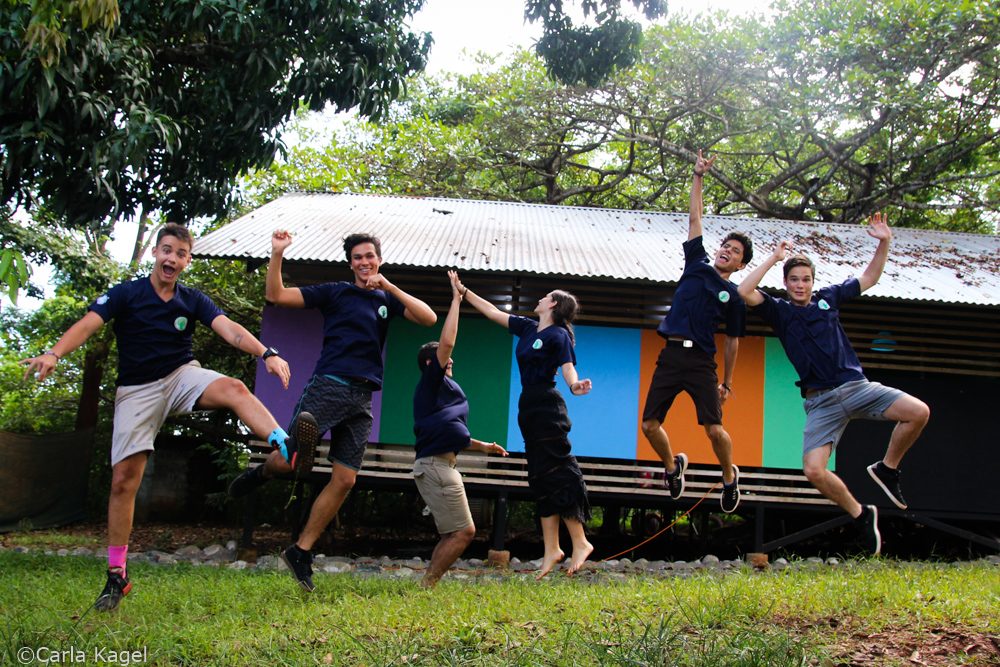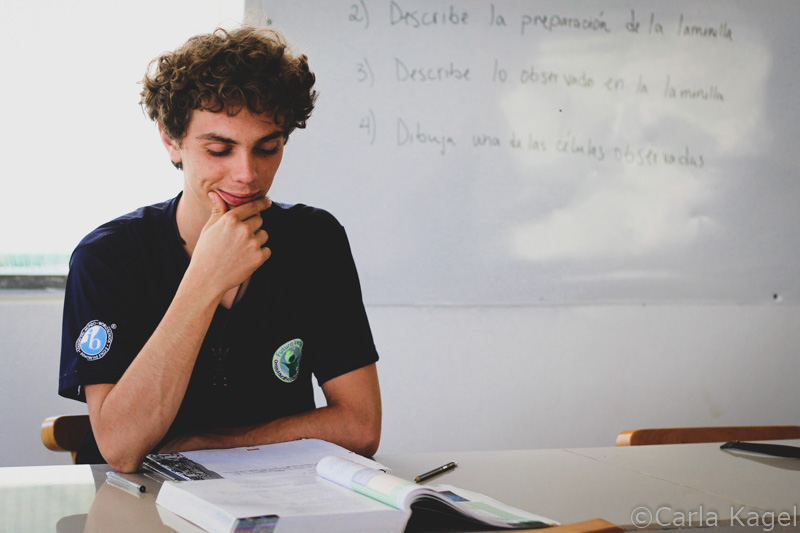
by Stuart Millar, IB coordinator | Nov 1, 2019

October is a busy month in the International Baccalaureate calendar for schools on a November exam schedule such as Futuro Verde. Grades for internal evaluations have to be submitted, along with the required supporting materials. Internal evaluations come in different forms: individual orals about works of literature; interactive or group orals; research projects in Business Management, Biology, and Math; the Visual Arts exhibition; and musical creating and performing. This year our students have composed music, performed, exhibited their works of art and undertaken research projects about the correlation between sports activity and academic achievement, whether a local hotel should target the holistic wellness segment of the hospitality industry, and to determine if there is a correlation between cases of Tuberculosis and the Human Development Index (HDI) in Europe. Internal evaluations are assessed by Futuro Verde teachers according to IB criteria, with samples of assessed student work being sent to the IB organization for moderation. This is how the IB organization assures that students from different schools are assessed as fairly and equally as possible.
The variety of projects that our students undertake and the support they receive is in no small part due to the qualifications, expertise, and experience of our teachers at Futuro Verde. This is just one of the key strengths and unique selling points of Futuro Verde compared to other institutions in the area. Our teachers are specialists, all of them possessing degrees in their areas of knowledge, be those in early childhood education, primary education, special education, science, math, business, and languages, etc. Many hold advanced degrees, sometimes in more than one area of specialty, and a high proportion has earned masters degrees in education. Add to that the experience they bring from all over the world and our students have a wealth of knowledge and experience to draw from.
Our teachers are authentic lifelong learners and Futuro Verde supports all of them to be so. IB requires that teachers giving instruction in diploma program subjects have attended Category 1 workshops, which are either face-to-face or online. Going one step further, we have just registered our teachers for multiple advanced Category 2 and 3 workshops which will take place over the next six months. In September we were visited by Dr. Mia Sosa-Provencio and her team from the University of New Mexico (USA) as they worked with all our teachers from preschool to 12th grade to develop collaborative classroom strategies featuring Latin American narratives of struggle and resilience amid structural oppression. Every year we hold the Bilingual Holistic Sustainable Educational Conference and this year we were lucky enough to have David Rogers, Executive Director for Dual Language Education of New Mexico, as our keynote speaker. The success of BHS this year led to David inviting and sponsoring our teachers, by waiving the registration fee, to attend La Cosecha conference in New Mexico, USA. We are excited about all that our attendees are going to learn and bring back with them!

by Stuart Millar, IB coordinator | Nov 1, 2019

Octubre es un mes ocupado para las escuelas del Bachillerato Internacional que adhieren al calendario de exámenes de noviembre, como Futuro Verde. Las calificaciones para las evaluaciones internas deben presentarse, junto con los materiales de apoyo requeridos. Las evaluaciones internas vienen en diferentes formas: orales individuales sobre obras de literatura; orales interactivas o grupales; proyectos de investigación en gestión empresarial, biología y matemáticas; la exposición de artes visuales; y la creación e interpretación musical. Este año, nuestros estudiantes han compuesto música, realizado interpretaciones musicales, exhibido sus obras de arte y llevado a cabo proyectos de investigación sobre la correlación entre la actividad deportiva y el rendimiento académico, un caso de la industria hotelera en el segmento de bienestar holístico y la posible correlación entre los casos de tuberculosis y el índice de desarrollo humano (IDH) en Europa. Los profesores de Futuro Verde evalúan las evaluaciones internas de acuerdo a los criterios del IB y se envían muestras de trabajo estudiantil evaluadas a la organización del IB para su moderación. Así es como la organización del IB garantiza que los estudiantes de diferentes colegios sean evaluados de la manera más justa y equitativa posible.
La variedad de proyectos que nuestros estudiantes realizan y el apoyo que reciben se debe en gran parte a las calificaciones, la preparación y la experiencia de nuestros profesores en Futuro Verde. Esta es solo una de las fortalezas clave y ventajas únicas de Futuro Verde en comparación con otras instituciones en el área. Nuestros profesores son especialistas, todos poseen títulos en sus áreas de conocimiento, sea en educación temprana, educación primaria, educación especial, ciencias, matemáticas, negocios o idiomas, etc. Muchos tienen títulos avanzados, a veces en más de un área de especialidad, y muchos han obtenido maestrías en educación. Es más, la experiencia que traen de todo el mundo hace que nuestros estudiantes tengan una amplia gama de conocimientos y experiencias para aprovechar.
Nuestros maestros son aprendices de por vida auténticos y Futuro Verde los apoya plenamente. El IB exige que los docentes que imparten las asignaturas del programa del diploma hayan asistido a talleres de Categoría 1, ya sea en persona o en línea. Además, acabamos de inscribir a nuestros profesores en talleres avanzados de Categoría 2 y 3 que se llevarán a cabo durante los próximos seis meses. En septiembre, nos visitaron la Dra. Mia Sosa-Provencio y su equipo de la Universidad de Nuevo México (EE. UU.) para trabajabar con todos nuestros maestros desde preescolar hasta 12 ° grado a desarrollar estrategias de colaboración en el aula con narrativas latinoamericanas de lucha y resistencia en medio de opresión estructural. Cada año se lleva a cabo la Conferencia Bilingüe Holística Sostenible de Educación , tuvimos el agrado de contar con la presencia de David Rogers, Director Ejecutivo de “Dual Language Education” de Nuevo México, como orador principal. El éxito de BHS este año llevó a David a invitar y patrocinar a nuestros maestros, dispensando la tarifa de inscripción, a asistir a la conferencia de La Cosecha en Nuevo México, EE. UU. ¡Estamos entusiasmados con todo lo que nuestros participantes van a aprender y traer de vuelta con ellos!

by Stuart Millar, IB coordinator | Oct 3, 2019

11th grade is hard at work, raising funds for their upcoming trip to Guatemala at the end of November. Students will experience the sights and sounds of Antigua, climb a volcano, visit local villages, and be responsible for making meals for the group! This trip will be the culmination of fundraising activities that started at the beginning of last year. It is a fundamental part of Futuro Verde’s philosophy that students should be responsible for raising the money for their field trips. This way, families are not burdened with an extra cost and students learn about the results of effort and the value of money.
However, fundraising isn’t easy. Sodas are the traditional method at Futuro Verde, but you need a lot of sodas to raise $5,000! There have been lots of good ideas, and some very successful events, but sometimes putting these into practice has been a challenge. Across all grades we have been seeing some interesting initiatives: the chance not to wear uniform in exchange for a donation, raffles, garage sales, movie nights, and sponsored field trip t-shirts. One of the main challenges is that fundraising efforts normally target students and staff. As that is a relatively small population, all these initiatives are looking to benefit from the same limited pot of financial resources. One suggestion to all classes looking to pay for their field trips is to consider holding events that reach a wider audience. Also, maybe we’re missing a trick if we don’t involve parents, families, and friends and ask for their ideas and support.
So what’s next for 11th grade? A great collaboration between a student and his parents. Look out for an announcement about a raffle with a prize of dinner at Restaurant Montezuma!

by Stuart Millar, IB coordinator | Oct 3, 2019

Los estudiantes de undécimo año están trabajando arduamente con el fin de recaudar fondos para su viaje a Guatemala a finales de noviembre. Allí, los estudiantes experimentarán las vistas y los sonidos de Antigua, subirán un volcán, visitarán pueblos locales y serán responsables de preparar la comida para el grupo. Este viaje significará la culminación de las actividades de recaudación de fondos que iniciaron a principios del año pasado. Es una parte fundamental de la filosofía de Futuro Verde que los estudiantes se responsabilicen de recaudar el dinero para sus giras. De tal manera, las familias no se ven obligadas a pagar un costo adicional y los estudiantes aprenden sobre los resultados de su esfuerzo y el valor del dinero.
Sin embargo, recaudar fondos no es sencillo. Si bien las ventas de soda son el método tradicional en Futuro Verde, se necesitan muchas sodas para recaudar $ 5,000. Pese a que hemos tenido muchas ideas luminosas y algunos eventos muy exitosos, ponerlo todo en práctica a veces resulta desafiante. En todos los grados, hemos visto algunas iniciativas interesantes: ofrecer la posibilidad de no usar uniforme a cambio de una donación, rifas, ventas de garaje, noches de cine y camisetas patrocinadas para las giras. Uno de los principales desafíos es que los esfuerzos de recaudación de fondos normalmente se dirigen a los estudiantes y al personal del centro educativo. Puesto que se trata de una población relativamente pequeña, todas estas iniciativas buscan beneficiarse de la misma cantidad limitada de recursos financieros. Una sugerencia para todas las clases que buscan financiar sus giras es considerar eventos que involucren a un público más amplio. Además, es posible que no estemos aprovechando algún truco si no involucramos, ni pedimos consejo a nuestros padres, familias o amigos.
Entonces, ¿qué sigue para los estudiantes de undécimo? Una gran colaboración entre un estudiante y sus padres. ¡Estén atentos a un anuncio sobre un sorteo con el premio de una cena en el restaurante Montezuma!

by Stuart Millar, IB coordinator | Aug 27, 2019

On the morning of November 4th, 2019 our first cohort of IB diploma students will start their exams. Exams are spread over three weeks with Spanish and English in the first week, business management in the second week, and math studies, biology and music in the third week. By lunchtime on Thursday 21st November, after twenty hours of exams, we will have some very happy and relieved students, teachers and parents!
For some of us it’s been a long time since we did high school exams, and the IB exam format might be new and of interest to some of you. IB uses a range of exam instruments including essay answers of more than 1,000 words, analysis of music scores, and extended answers where students are required to demonstrate high-level analytical and evaluative thinking. It’s a far cry from the traditional exam format of multiple choice, short answers, and regurgitating memorized facts. For example, in business management, paper 1, the 2 hour and 15 minutes exam is based on a case study about a fictional business. The students have already received the case study of nearly two thousand words and are working to understand it, analyze it, and identify all the topics they might be asked about. In the exam they will be given additional information about the company and will be asked to recommend appropriate and effective business strategies for the company’s growth.
Before the exams even start the IB cohort is finishing off business, biology, and math projects as well as preparing for a visual arts exhibition! We’re very proud of the graduates of 2019. If you happen to see Elian, Lawrence, Mateo, or Dilana please be sure to wish them luck!




